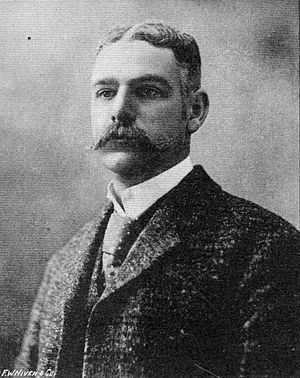remain a lasting monument to the memory of Mr. Davies and the civic fathers who worked with him. Mr. Davies has done much to encourage the formation of progressive institutions. Those products of democracy—building societies—have ever received his support, and in accepting the position of director of the Fremantle Building Society, he inspired confidence in the institution among the working classes, and induced many to take advantage of the opportunities offered to become the owners of their own homes. He also conceived the idea of erecting baths on the Esplanade, within an easy distance of the town.
Although so loyal to his native town, and anxious for its prosperity, Mr. Davies is very liberal in his ideas, and a warm supporter of any public work likely to be of advantage to the community at large. His interests are bound up in the land of his birth. In 1895 Mr. Davies was gazetted a Justice of the Peace.
HENRY ERNEST PARRY, J.P., M.I.C.E.
CIVIL engineering can reasonably claim to have solved many difficult problems in the physical world. The scope of its research is much wider than the name would lead one to suppose, embracing as it does all the fundamental principles of Natural Philosophy. Its contributions have not been directed to the piling up of a mass of abstract theories to adorn a classic volume, but rather to the interests of humanity by continual improvements and inventions for the expediency of a practical world. It were futile to speak but broadly of the many avenues and channels into which the science of civil engineering runs. The bare mention of railways, bridges, and roads—the most indispensable and useful means for universal transit—will serve to prove the practical importance of the profession. If custom did not blunt sensibility we should look on these as, par excellence, the monuments of skill. Even in this colony, where infancy forbids for obvious reasons the higher results of civil engineering, the foundations on which she rears her superstructures are the legacy and outcome of the bare first principles of this limitless science. Travellers who sit at ease in a luxurious compartment, and think merely of the journey's end might read with profit the lives of those who devise the means to facilitate and render comfortable their passage from one point to the other.
 |
Photo by H.E. PARRY, J.P., M.I.C.E. Greenham & Evans. |
In the development of railway extension, so great a boon in Western Australia, Henry Parry has been an indefatigable worker. He was born in the Island of Barbados, in the West Indies, in 1856. His grandfather was Bishop of that isle for many years, and his father, who was Co-adjutor Bishop of Barbados, and a learned, pious, and distinguished man, came to Perth in 1877, as Bishop of the colony. At the age of ten years Henry left Barbados, and was taken to England. He received a capital mental training. At Clifton, his uncle, St. John Parry (the noted coach), who was undoubtedly one of the great classical grammarians of his time, took him under his careful supervision, and crammed his youthful mind with much scholastic feeding. Here he first revelled in the irregularities of Greek verbs and verse, and heard the pathetic tale of some noble epic. He had been a pupil, too, of Harrison's College in his native island, which boasted a brilliant staff of teachers. Its teacher of mathematics—that science so indispensable to the region of calculation and mensuration—could ably cope with the absent-minded professor in his subject. It is to him that Mr. Parry owes his first love for science, and the material of his valuable teaching is indelibly impressed on his memory. He apprenticed himself in early years to George Bowen, in Huntingdonshire, England, and qualified as a civil engineer within the specified time.
In 1878 Mr. Parry sailed for Western Australia to his new home in Perth. The Government about this time was forced by public needs to extend railway communication in the colony. People coming fresh from the facilities and comforts of the home country grumbled complainingly against tedious and longsome travel by coach. Mr. J. H. Thomas, engineer-in-chief to the Government, appointed Mr. Parry assistant engineer on the new Eastern Railway. In 1880 the trial lines were satisfactorily laid after a year's hard work, and the completion of the work conferred an immense boon on all the colonists, and had the further advantage of opening up and developing these parts of the colony, more especially from an agricultural point of view. From 1881 to 1883 Mr. Parry was locomotive superintendent and resident engineer of the Geraldton and Northampton Railway. At the end of the latter year his services were transferred to the Eastern Railway. He was appointed assistant resident engineer under Mr. Clayton Mason. A more responsible position was soon given to one who had shown himself so capable of filling with the utmost satisfaction all his previous offices. In 1885 he
